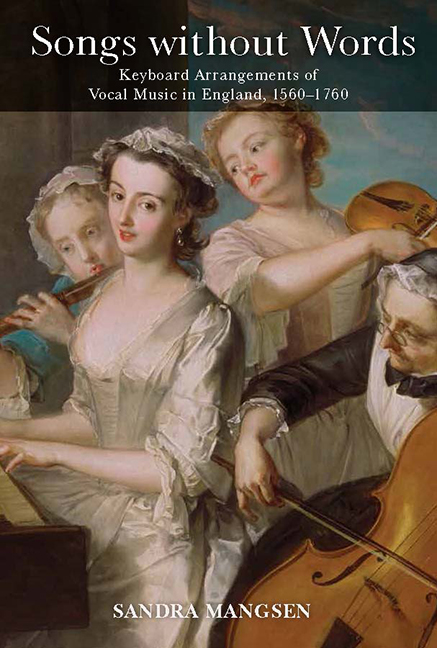Book contents
- Frontmatter
- Dedication
- Contents
- List of Illustrations
- Preface
- Acknowledgments
- Abbreviations
- Introduction
- 1 Ballads Transformed
- 2 Arias Domesticated: The Ladys Entertainment and Other Early Eighteenth-Century Anthologies
- 3 With Their Symphonies: William Babell and The Ladys Entertainment Books 3 and 4
- 4 Opera Remix: Babell's Suits of 1717
- 5 After Babell: Arrangements for Ladies and Gentlemen
- 6 Afterthoughts
- Appendix The Ladys Banquet (Second Series): Contents, Concordances, and Dissemination
- Notes
- Bibliography
- Index
4 - Opera Remix: Babell's Suits of 1717
Published online by Cambridge University Press: 17 July 2019
- Frontmatter
- Dedication
- Contents
- List of Illustrations
- Preface
- Acknowledgments
- Abbreviations
- Introduction
- 1 Ballads Transformed
- 2 Arias Domesticated: The Ladys Entertainment and Other Early Eighteenth-Century Anthologies
- 3 With Their Symphonies: William Babell and The Ladys Entertainment Books 3 and 4
- 4 Opera Remix: Babell's Suits of 1717
- 5 After Babell: Arrangements for Ladies and Gentlemen
- 6 Afterthoughts
- Appendix The Ladys Banquet (Second Series): Contents, Concordances, and Dissemination
- Notes
- Bibliography
- Index
Summary
Which few could play but himself
Babell's aria arrangements in books 3 and 4 of The Ladys Entertainment had already begun to detach themselves from their origin as stage music, but in the Suits advertised in January 1717 that process reached its zenith. The full title of the collection is: Suits of the most Celebrated Lessons Collected and Fitted to the / Harpsichord or / Spinnet by Mr: Wm: Babell / with a Variety of Passages by the Author (London: Walsh and Hare, [1717]). John Hawkins remarked upon the virtuosic demands of Babell's arrangements, which are greater in this collection than in books 3 and 4 of The Ladys Entertainment:
His first essay in composition was to make the favourite airs in the operas of Pyrrhus and Demetrius, Hydaspes, and some others, into lessons for the harpsichord. After that he did the same by Mr. Handel's opera of Rinaldo, and succeeded so well in the attempt, as to make from it a book of lessons, which few could play but himself, and which has long been deservedly celebrated.
Six years had passed since the publication of The Ladys Entertainment, book 4, and in the interim Babell had likely determined that his future was tied more to the keyboard than to playing the violin in London orchestras. In the Suits he presents himself as a harpsichord virtuoso and may have been looking not only for admirers but also for potential students. At the time, the situation for violinists playing for the Italian opera was certainly not encouraging: there were only thirty-one performances at the Haymarket in 1716/17, and that spring Heidegger's company simply collapsed. In the following season only the English-language productions at Lincoln's Inn Fields and Drury Lane might have offered employment for theater instrumentalists. By 1718, however, Babell's reputation as a keyboard player and arranger or composer was certainly secure. In April of that year Daniel Wright advertised “A choice Collection of new Tunes for the Harpsichord by Mr. Babel and other masters.”
The advertisement apparently refers to The Harpsichord Master Improved, whose title page reads, “The Newest & most Air'y Lessons With a Variety of Passages by Mr. Babel.” Two pieces borrowed from the Suits open the volume.
- Type
- Chapter
- Information
- Songs without WordsKeyboard Arrangements of Vocal Music in England, 1560–1760, pp. 119 - 155Publisher: Boydell & BrewerPrint publication year: 2016

